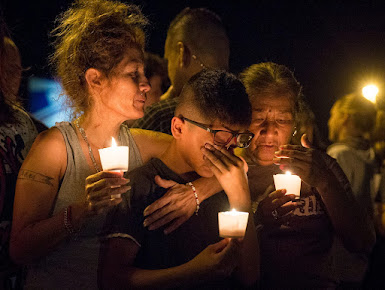In the most recent tragic events that happened in Fort Worth, I caught myself thinking "This could have easily been avoided if the necessary precautions were taken". Instead of taking into consideration the lives that were lost, changed, and quite possibly forever ruined, I was simply thinking of ways this can be avoided in the future. I first thought that I was a monster for not being able to empathize with these people, but Social Media has changed the ability to empathize with human beings. Do we simply not care, or do we choose to overlook these issues? Many researchers connect the inability to empathize directly to social media but with this technology giving us the ability to communicate with others with others with ease, why is our ability to empathize challenged?
Social Media creates this bridge between Creator and Viewer which, at first glance, should facilitate the ability to place themselves in someone else's shoes from the sheer amount of content we are presented with, but sometimes this content can harm us emotionally to the point where we view terrible things all the time. According to a blog post in Move, we as human beings can suffer from compassion fatigue since we view the same (but different) event. Although this can be seen as indifference, it's just us shutting out the reaction since feeling bad about someone aside oneself can become emotionally exhausting, and by accepting that the world is a bad place where bad things happen, we can save a lot of emotional energy.
Candlelight Vigil held for the victims of the Sutherland Springs shooting
Empathetic concern is ironically the reason why many tend to empathize less and less with the world. In a theses by Franklin Thomas from Georgia Southern, this concern leads to an altruism that is selfless and focused more on reducing the distress of others than on reducing one’s own distress, but what happens when this concern is something that seems to be repeating itself nonstop? It begins to become something too big to bear, and one gets tired of carrying someone's else's cross. But sometimes, we are so uneducated towards the issue at hand that we use our own personal beliefs to determine between right and wrong which results in ignorance, which tends the main issue in every aspect of social media.
Similarity and group membership can also influence the expression of empathy and with the media portraying the fronts of war between 2 groups that are in conflict, we then begin to take sides for the group we share more in common with. The Black Lives Matter movement was a huge event that showcased peoples true color. The movement was popular amongst the common population since many were shown that life for the average African American is challenged with everyday racism, much of it that we are not aware of. This lead to the other side of the argument, with many battling the movement by saying All Lives Matter! Which although is 'true' since no life is more important than another, this hugely overlooks the issue of brutality against the African American population and creates an ignorance towards the issue at hand. People were tired of feeling like second class citizens compared to the Caucasian population, and many were aware of this negative behavior but since it was normalized in American Society, chose to overlook it. When they decided enough was enough, many took the streets to protest peacefully yet those on the other side of the argument saw these people as rioters and criminals, seemingly unempathetic towards their cause.
Twitter is notorious for unempathetic behavior with the defense of 'Chill out, it's a joke'. At times we thrive off someone else's misery and give not much thought about it past the retweet, but this active form of social ignorance can branch out to subtle parts of our social behavior since the idea that we trade our offline personality for our online personality is myopic. We are subjects to shocking media so often that one views this media to the point where its normalized, but we have the ability to not be affected but know we have to somehow enact change in this sort of medium. We can accept that things are happening, but fighting this "Normalized" behavior can begin a snowball effect of many stating their distaste towards the media presented which can lead to major movements.
In conclusion, our inability to empathize with others can stem from many things, ranging from the exhaustion of our empathy, choosing to ignore certain things because of its sensitive or controversial nature, to simply accepting that things happen. Although many of these actions can be perceived as negative, in the end it's how we cope with bad things happening around us and if one is used to these bad things happening, why would they choose to care if it's going to happen again?





No comments:
Post a Comment